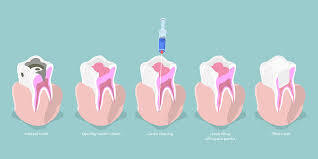Introduction :
Root canal therapy, often perceived as a daunting dental procedure, is actually a highly effective treatment for saving and preserving natural teeth. Contrary to popular belief, it can provide significant relief from pain and discomfort while promoting long-term oral health. In this article, we will explore how you can maximize the benefits of root canal therapy and ensure a successful treatment outcome.
Understanding the Procedure
A root canal is a dental procedure performed to treat infected or damaged tooth pulp, the soft tissue inside the tooth. During the procedure, the dentist removes the infected pulp, cleans the inside of the tooth, and seals it to prevent further infection. Despite its reputation, root canal therapy is a relatively straightforward and painless procedure that can save your natural tooth from extraction.
Benefits of Root Canal Therapy
Root canal therapy offers several benefits, including:
- Pain Relief:
By removing the infected pulp, root canal therapy alleviates toothache and discomfort associated with dental infections.
- Preservation of Natural Teeth:
Unlike tooth extraction, which requires replacement options like implants or bridges, root canal therapy allows you to retain your natural tooth structure.
How to Prepare for a Root Canal
Before undergoing root canal therapy, it’s essential to discuss the procedure with your dentist and address any concerns you may have. Your dentist will evaluate your dental health and provide instructions on how to prepare for the treatment. This may include antibiotics to control infection or pain management strategies.
Maximizing the Benefits
To ensure optimal results and maximize the benefits of root canal therapy, follow these tips:
- Follow Post-Treatment Instructions:
Your dentist will provide specific instructions for aftercare, including oral hygiene practices and dietary restrictions. Adhering to these guidelines can promote healing and prevent complications.
- Maintain Oral Hygiene:
Brush and floss regularly to keep your teeth and gums healthy. Good oral hygiene habits can prevent future dental problems and prolong the lifespan of your root canal-treated tooth.
Dietary Considerations After Root Canal
After root canal therapy, avoid hard, crunchy foods that may exert pressure on the treated tooth. Opt for soft, nutritious foods that are gentle on your teeth and promote healing. Incorporate foods rich in vitamins and minerals to support overall dental health.
Long-Term Care and Maintenance
Regular dental check-ups are essential for monitoring the health of your root canal-treated tooth and detecting any potential issues early. Your dentist may recommend periodic X-rays to assess the integrity of the tooth structure and ensure its long-term stability.
Addressing Concerns and Misconceptions
Many misconceptions surround root canal therapy, including the belief that it is a painful or risky procedure. In reality, advancements in dental technology and anesthesia have made root canal therapy a comfortable and safe treatment option. Addressing concerns and dispelling myths can help alleviate anxiety and encourage patients to seek timely dental care.
FAQs
- Is root canal therapy painful?
- Modern techniques and anesthesia ensure that root canal therapy is relatively painless. Discomfort during the procedure is minimal.
- How long does a root canal procedure take?
- The duration of a root canal procedure depends on various factors, including the tooth’s location and complexity. On average, it may take one to two hours per tooth.
- Can I take my own car home after having a root canal?
- In most cases, it is safe to drive yourself home after a root canal procedure, as the effects of local anesthesia wear off quickly.
- Is root canal therapy covered by dental insurance?
- Many dental insurance plans cover root canal therapy, although coverage may vary depending on the type of insurance and your specific plan.
- How long does a root canal-treated tooth last?
- A tooth that has had a root canal therapy can survive a lifetime with the right upkeep and care. . Regular dental check-ups and good oral hygiene practices are essential for its longevity.
Conclusion
Root canal therapy is a valuable treatment option for preserving natural teeth and restoring oral health. By understanding the procedure, following post-treatment instructions, and maintaining good oral hygiene, you can maximize the benefits of root canal therapy and enjoy a healthy smile for years to come.


